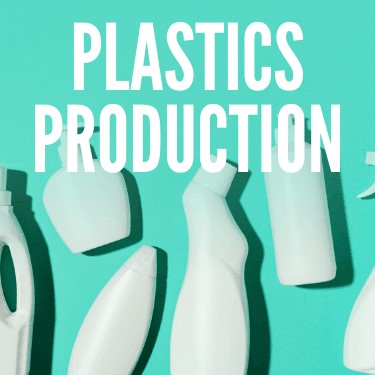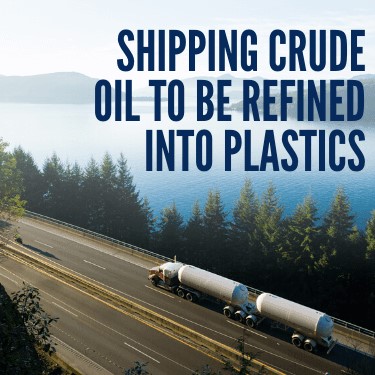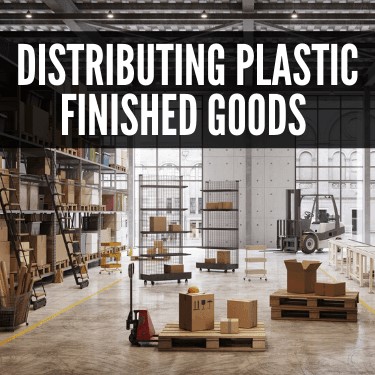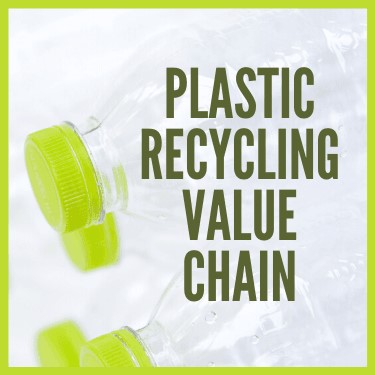The plastic distribution supply chain has its fair share of challenges. That’s why you need a trustworthy shipping partner like R+L Global Logistics to help you manage your plastic supply chain. It can be difficult to maintain transparency throughout the supply chain, but freight visibility is one of our specialties! In fact, we can help with just about every step in the supply chain.
The plastic distribution supply chain has many elements to consider, including sustainability, transparency, and transportation. In addition to that, you will need to consider the laws associated with manufacturing and transporting plastics.
Plastic is used in every industry and every avenue of our lives. There’s plastic in cars, in kitchen utensils, as wire coatings, in medical equipment, in children’s toys, and even in clothing. It can be used for almost anything, and that, coupled with the fact that it is lightweight, cheap, durable, and easy to produce, explains the explosive popularity it’s had in the last couple of decades.
Plastic can take many forms, including rubber, foam, fabric, plastic wrap, hard plastic, and much, much more. However, despite that versatility, it’s primarily used for one thing. According to National Geographic, 40% of plastic is made into single-use, disposable packaging. That includes single-use plastic packaging for food products, toys, and just about everything else.

Plastics are made of natural materials extracted from coal, natural gas, salt, cellulose, and the most important source, crude oil. Processing the oil into plastic is a relatively complex chemical process, but to put it simply, the oil is distilled in an oil refinery to separate the heavier and lighter components of it. The lighter components are collected, and a catalyst is added to it to change the structure of the polymers in the material.
Different combinations of monomers in the polymers create plastics with different properties. That’s how materials as different as resin and plastic wrap can both be called “plastic.” However, as I’m sure you can imagine, this process is tightly regulated to ensure the health and safety of the environment. Refining crude oil is a process that releases a range of different chemicals into the air that contribute to global warming and pollution.
The Environmental Protection Agency (EPA) is the government agency in charge of regulating the manufacture of plastics, since the process of refining crude oil involves many chemicals that can be harmful to the environment.
The first thing you need to know is that all facilities manufacturing plastics must comply with the reporting requirements of the Greenhouse Gas Reporting Program (GHGRP). That program requires all plastic manufacturers to report their annual greenhouse gas emissions to the EPA so they can be recorded and measured on a national scale. That includes facilities turning oil and other raw materials into plastic, manufacturing plants turning plastic pellets into plastic bottles, plastic recycling facilities, and even factories that produce synthetic fibers like nylon for textile manufacturing.
You will also need to be compliant with the applicable National Emission Standards for Hazardous Air Pollutants (NESHAP). There are different regulations depending on what type of plastic you are manufacturing, including polyurethane foam, rubber car tires, plastic coatings for wires, and even plastic printed graphics on T-shirts.
Another regulation you’re going to need to know if you are dealing with the transport of chemicals or raw materials is the Toxic Substances Control Act (TSCA). Similarly, you may need to comply with HazMat shipping regulations and hazard communication requirements, like with the Globally Harmonized System of Classification and Labelling of Chemicals (GHS).
You might also need to be aware of chemical shipping regulations. Learn more and see how an expert freight partner can help you stay compliant.

To move crude oil to a plastics manufacturing plant, you would require either a tanker truck or a regular freight truck filled with oil barrels. In most places in the U.S., either truck can be driven on public roads if their gross weight is kept under 80,000 pounds, so both are good options if you have lots of oil to ship.
Merely fitting the material on a truck is not all you need to think about, however. Crude oil is considered a hazardous material since it could cause serious damage to the environment, wildlife, and human lives if it spills. That means you will have to ensure that the carrier you use, regardless of whether they’re driving a tanker truck or a freight truck, is compliant with all Department of Transportation (DOT) Pipeline and Hazardous Materials Safety Administration (PHMSA) regulations.
Basically, what that boils down to is informing the public. As the shipper, you are responsible for providing safety data sheets, labeling your boxes, and a number of other things to meet HazMat requirements, but did you know that you are also required to provide your carrier with the correct placards?
Placards are giant versions of the HazMat labels that go on individual boxes. These placards go on the outside of the truck moving the hazardous freight, to alert the public of what is inside the truck. It is not the carrier’s responsibility to source the correct placards. There are countless different kinds, so you need to make sure you provide the correct type prior to your shipment being loaded onto the truck. A carrier will not take your HazMat freight without the proper placards, and even if they did, that could put you at serious legal risk.
Placards must then be attached to each side of the vehicle, including the front. In addition to that, though, they also must be clear of ladders, high contrast, bordered, and away from other text, ads, or patterns on the truck. The goal is to make them as easy to see as possible, with nothing surrounding them that could obstruct, camouflage, or detract from the placards. Ideally, one placard should always be visible, no matter what angle you are looking at the truck from.
Total transparency is essential for a functioning supply chain. All suppliers, manufacturers, and executives should be kept in the loop so everyone can collaborate efficiently. If manufacturers know exactly when to expect shipments from their suppliers, then they can prepare to receive them in advance. Likewise, executives can keep customers informed about exactly when products will become available again. Being able to give people exact dates in reference to when things will be delivered, both for customers and internal employees, can make a company appear more reliable, efficient, and trustworthy.
However, that is much easier said than done. Trying to coordinate people working in the same office or manufacturing plant can be a challenge, and that is only exacerbated by including other branches and companies involved in the supply chain.
However, there’s one way a good 3PL can help.
Plastics spend a lot of their time in transit. Raw materials have to get delivered to a plastics manufacturer, and once it has been refined, it must be transported to a manufacturer that will turn it into packaging, a product, a part, or something else. From there, it may get transported to another manufacturing plant to get assembled, completed, or filled. And from there, it has to get to stores and consumers! And the worst part is that almost every single time the material is moved, someone else is responsible for its transportation. It’s easy to see how you can sometimes lose sight of where your materials are and where they come from.
With a 3PL like R+L Global Logistics, you can take advantage of state-of-the-art track and trace technology, that gives you real-time visibility to where your freight is, where it’s coming from, and when and where it will arrive. If we assist throughout the process, you’ll be able to trace your products and materials with accuracy, all the way back to their origin and throughout the supply chain.

Once you have an order of completed products, you need to be able to ship them to multiple different points around the country. The greater the reach of your retailers, the larger your potential customer base is. Even if you have an online store, you need to ship your product to multiple different warehouse locations so you can offer fast shipping no matter where an order comes from.
However, organizing the transportation of goods to multiple different locations can be a tremendous hassle… if you aren’t working with the right people. R+L Global Logistics has the structure and organization to make even the most complex jobs possible. We can ship multiple different orders out at once and offer you real-time freight visibility for every single one of your individual shipments. We can also arrange to have one truck make multiple different stops at different locations to drop off goods.
However, R+L Global Logistics can offer you more than just shipping services. With our network of supply chain partners, we can also offer services like warehousing and distribution in all 48 contiguous U.S. States. If you want to make your supply chain management simpler, then working through one company for all your supply chain needs is the best way to do that!
Sustainability is a growing concern in the industry, and it could be quite important to some of your customers. Despite the incredible advancements in food-saving that can be accredited to plastic packaging, the fact is that disposable plastic waste is becoming a problem too large to ignore. To put it into perspective, 90.5% of all plastic in the world has never been recycled. The rest pile up in landfills or float around the oceans.
Besides just recycling, which we’ll get into below, there are many ways that you can work towards making your business more sustainable. If you use plastic for packaging, consider an alternate form of sustainable packaging like recycled paper or jute bags. You can also work towards 0 net waste initiatives and sustainable energy solutions in your facilities.
Aside from helping the planet, plastic sustainability can have many more benefits for your business if you commit to it.

Recycling is part of an advanced value chain that can actually end up making you more money in the long run. The most basic understanding of the plastic recycling value chain is that through recycling, a material can be turned into a new product and resold at a profit, instead of being scrapped and thrown away. However, there are many other factors that subtly add value in different ways.
One of the ways in which recycling products can help you make more money is by improving your brand’s reputation. Being a brand that uses recycled plastics makes you the first choice for customers who care about the environment. By creating a brand persona that cares about the environment and is committed to sustainable practices, your reputation will end up attracting new customers with little added work on your part. It also provides you with unique marketing opportunities.
In addition to that, recycled products have more perceived value to customers because they stand for something more important than the product itself. It’s not just an object at that point. It is a representation of your company’s values and commitment to protecting the environment. To some, that is the most important selling point for a product.
With all that said, it isn’t like you can flip a switch and start using recycled plastic in the blink of an eye. First, you need to source it from somewhere, and then you need to be able to transport it from that waste facility to another facility with the capability of recycling it. That means you will need to partner or collaborate with other companies in order to get the recycled plastic to begin with.
Once the plastic has been recycled, then you will need to arrange to have it shipped to your manufacturing plants to turn it into products. This all requires a lot of careful, logistical planning and a good transportation network to get things delivered on-time and running smoothly. That’s where R+L Global Logistics comes in. Our shipping professionals are experts at moving all types of freight quickly, and we can even set up a regular schedule of shipping services to keep your plastic supply chain moving at all times.
There are many different ways a 3PL can assist in the plastic distribution supply chain. Not only can 3PLs offer superior rates for shipping and delivery, but they often have a range of other services that they specialize in.
For example, here at R+L Global Logistics, we offer services such as expedited shipping, refrigerated shipping, and heavy haul shipping. In addition to that, we also have partners throughout the supply chain, logistics, and transportation industries that allow us to offer warehousing, fulfillment, tradeshow shipping, white-glove delivery, and much more.
Not only would you be able to take advantage of a range of different services, but you could also have access to logistics experts and customer support agents 24/7, several of whom are multilingual. Plus, you could take advantage of these expert’s knowledge to help you understand the shipping process and what is expected of you, the shipper. We can help you understand HazMat shipping requirements, explain what shipping documents are required, and anything else you might need to know about the process.
No matter what your request is, or what your shipping situation is, or what your questions are, R+L Global Logistics can help.
Regardless of whether you’re transporting raw materials and chemicals, or if you’re shipping completed plastic products, R+L Global Logistics can be your trusted partner for every step of your plastic distribution supply chain. With our range of helpful services and flexibility to meet any customer’s needs, you’ll find that we have a solution for every shipping situation!
By working with us, you can take advantage of the following benefits:
R+L Global Logistics can help you manage more than just the plastic distribution supply chain. With our diverse range of services, we can assist you in transporting just about anything! If you need help shipping farm equipment or shipping fitness equipment, we’ve got you covered! Need to transport lima beans? We do that too! No matter what you have to ship, you can count on us to get it delivered on-time, intact, and with world-class customer service! So what are you waiting for?
If you’re ready to get started, give us a call at (866) 353-7178 today to request a free freight quote!
R+L Global Logistics
315 NE 14th St., Ocala, FL 34470